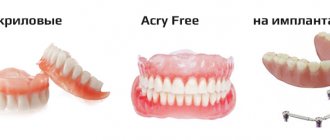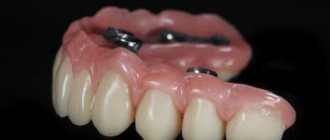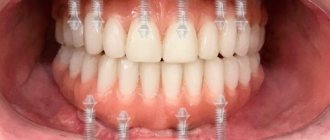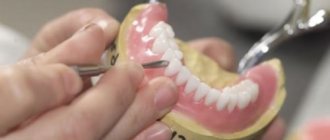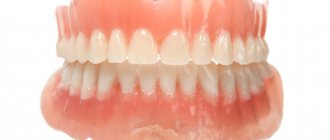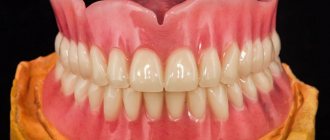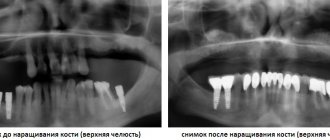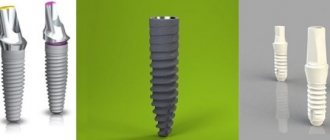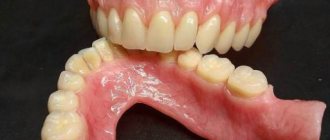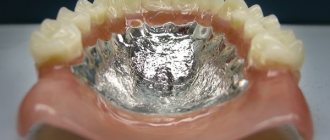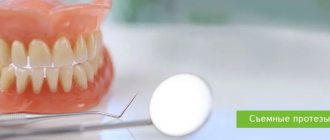27.11.2019
Today, teeth can be restored even if they are completely absent from the oral cavity. At the same time, it is not necessary to implant implants to attach a removable denture. There is a non-traumatic way to regain your dental organs, albeit artificial ones - these are dentures with suction cups. Let's look at their features in this article.
Design of a prosthesis with suction cups and its fixation
In fact, there are no suction cups in removable dentures. A denture with suction cups is made of polymer materials, and the suction effect is created by making it using precise impressions of the jaws.
When making a denture, a dental technician pays great attention to its edges, because they will touch the transition zone between the fixed and moving parts of the mucosal border. The edges should overlap the area where the gum joins the lip or cheek by 1-2 millimeters. This creates a circular valve that prevents the formation of air under the prosthesis. It is for this reason that the denture seems to stick to the gums.
The prosthesis is held in the desired position using suction cups thanks to two of its features:
- Suction, achieved due to the vacuum in the cavity between the prosthesis and the mucosa.
- Adhesiveness is achieved due to the complete compliance of the surface of the structure with the relief of the gums and palate, as well as the presence of a layer of saliva between them.
These structures on the upper jaw hold up much better than on the lower jaw. After all, the upper jaw is characterized by less mobility and a larger area of the hard palate. To fix the product more firmly on the lower jaw, special glue is used.
Advantages and disadvantages
Let's consider the main advantages of suction cup prostheses:
- Aesthetic component - all the curves of the teeth and gums are repeated, the color matches the natural one.
- Comfortable use thanks to the elasticity of the material.
- Affordable price.
- Quick adaptation without much discomfort.
- Tight fit to the gums.
- The safety of the prosthesis on suction cups, which does not lead to injury to the gums, tongue and cheeks.
- No chafing or swelling.
- High wear resistance.
- Functionality regarding chewing and speaking. The products are effective even when chewing hard food (meat).
- They do not require grinding of teeth before prosthetics.
- They can be retained in the oral cavity even with complete edentia.
- There is no displacement of the prosthesis when eating.
- There are no absolute contraindications for use.
- Can be used at any age.
The products also have disadvantages. They are as follows:
- Not very reliable fixation on the lower jaw. In this case, you need to use special glue.
- Some substances contained in the prosthesis may cause an allergic reaction.
- For care, be sure to purchase a special cleaning brush.
- Possibility of formation of a gag reflex during the first period of wearing.
- You should not chew nuts, crackers, etc. with your teeth. Viscous foods that can stick are also prohibited.
- Short service life. It is recommended to change such prostheses every 4 years.
- The load when using a prosthesis is distributed unevenly, which can cause bone tissue atrophy.
Removable dentures on implants –
Conventionally, removable dentures on implants are called “conditionally removable”, because despite the fact that the patient can remove and put on such a prosthesis at any time, the latter is very securely fixed on the implants. This design is reminiscent of prosthetics with a clasp prosthesis with a locking fastening, only the micro-locks here are not on metal-ceramic crowns, but not on the protruding parts of 2-3 implants.
If you have a completely toothless lower jaw or toothless jaws with a high degree of bone atrophy, then good fixation of a removable denture can only be achieved using this method of prosthetics. In addition, such dentures have a significantly smaller denture base than complete removable dentures made of nylon or plastic. Some sources also call this type of dentures the term – overdentures.
Covering dentures on implants - prosthetic options
- Prosthesis on implants with a button-type micro-lock (Fig. 15-17) - 2-3 mini-implants are implanted into the jaw, into which spherical attachments are then screwed (they will protrude above the surface of the mucosa in the form of metal round heads). In the projection of the attachments on the inner surface of the body of the removable denture, recesses are made into which the fixing mechanism - silicone matrices - is inserted.
When you put on the prosthesis, the heads of the attachments fall into the fixing mechanism (silicone matrix), and the prosthesis is securely held. Such a prosthesis can never fly off on its own. You can remove it only by applying slight force with your hands. With such a denture, you will be able to chew comfortably, talk confidently with other people, without fear of the denture falling out.
- A prosthesis on implants with a beam-type micro-lock - 2-3 implants are also implanted into the jaw, onto which a metal beam is then fixed. In the projection of such a beam on the inner surface of the body of the removable denture, a recess is made corresponding to the exact size of the beam and one or more silicone matrices are inserted there, which, when putting on the prosthesis, will tightly grip the beam.
Covering dentures on intracanal implants –
There is also a cover prosthesis of another type. To implement such a prosthesis, it is necessary that the patient has 2-4 strong single-rooted teeth or at least the roots of teeth (preferably canines or premolars) left in the jaw. To make such a prosthesis, the crowns of the remaining teeth are first cut down to the root, and their root canals are filled.
Then implants are screwed into the root canal of each root (Fig. 28), resembling large pins, which will have an element in the form of a metal head protruding above the root (i.e., just like a prosthesis on implants with a push-button micro-lock).
On the inner surface of the prosthesis, in the projection of the metal heads, recesses are made into which silicone retaining matrices are inserted in the same way. As a result, you get excellent fixation of the prosthesis, comfortable painless chewing even of hard food, and due to the preserved roots of the teeth, the atrophy of the bone tissue of the toothless jaw slows down sharply, which helps to increase the service life of the prosthesis.
Indications and contraindications
Let's consider the main advantages of suction cup prostheses:
- Aesthetic component - all the curves of the teeth and gums are repeated, the color matches the natural one.
- Comfortable use thanks to the elasticity of the material.
- Affordable price.
- Quick adaptation without much discomfort.
- Tight fit to the gums.
- The safety of the prosthesis on suction cups, which does not lead to injury to the gums, tongue and cheeks.
- No chafing or swelling.
- High wear resistance.
- Functionality regarding chewing and speaking. The products are effective even when chewing hard food (meat).
- They do not require grinding of teeth before prosthetics.
- They can be retained in the oral cavity even with complete edentia.
- There is no displacement of the prosthesis when eating.
- There are no absolute contraindications for use.
- Can be used at any age.
The products also have disadvantages. They are as follows:
- Not very reliable fixation on the lower jaw. In this case, you need to use special glue.
- Some substances contained in the prosthesis may cause an allergic reaction.
- For care, be sure to purchase a special cleaning brush.
- Possibility of formation of a gag reflex during the first period of wearing.
- You should not chew nuts, crackers, etc. with your teeth. Viscous foods that can stick are also prohibited.
- Short service life. It is recommended to change such prostheses every 4 years.
- The load when using a prosthesis is distributed unevenly, which can cause bone tissue atrophy.
Features of new generation prostheses without palate
Open-air structures do not have a massive ceiling and are lighter and more comfortable. Therefore they are called new generation prostheses. Due to their compact size, they do not cause discomfort, do not cause a gag reflex, and do not impair diction. With significant absence of teeth in some designs, a small arch is still present for reliable fixation in the mouth. But the septum does not cover the receptors, so taste reactions are preserved. In complete removable dentures, it is impossible to exclude a massive palatal element.
Types of products
With respect to the material being manufactured, suction cup dentures are divided into:
- Acrylic ones appeared earlier than other types of suction cup prostheses. They completely replicate the external features of living teeth and gums. Manufactured by injection molding. The inner side of the denture is equipped with a silicone insert, which distributes the load when chewing. Dentures with suction cups last a long time and are inexpensive. The main disadvantages are the presence of a toxic substance in the composition that can cause allergic reactions, the inability to resist mechanical damage and the porosity of the material, which promotes the development of microorganisms on the product.
- Nylon is hygroscopic and therefore resists the development of microorganisms. Their advantages are also elasticity, minimal trauma to the mucous membrane, high resemblance to living gums and teeth, resistance to staining, high suction ability, long service life, the ability to withstand significant loads when chewing, the absence of allergens and the ability to install them on weak gums. The negative aspects include the need to use a special solution and a special brush for cleaning, as well as the lack of possibility of restoration (if it breaks, the design is completely changed).
- Polyurethane dentures are made from flexible plastic. They are the most popular today in comparison with other types of products. Suction cup dentures are flexible, elastic, have excellent suction, strength, and durability. They do not absorb moisture, do not cause allergies, do not deform from heavy loads and high temperatures, last a long time and are inexpensive. If the patient has several of his own teeth, the denture is made so that the palate is open, without blocking the taste buds.
- Polypropylene prostheses are the oldest option, used back in the 70s of the 19th century. They are durable and elastic. This material is characterized by high plasticity, which contributes to a good fit to the palate and the absence of displacement during conversation. During manufacturing, a frame is made of polypropylene, and artificial dental organs are attached to it. Polypropylene is practically transparent, merging with the mucous membrane after installation.
Myths about tooth loss
It has long been known that living a century is not a super task. This is probably approximately how long people should live. Myths, legends, and theological manuscripts contain information that life expectancy should be 600 years, 800, 1000. The reality is different. A record, but not uncommon, is 100-120 years. Most people live 60-80 years. Often the cause of death is illness, namely, diseases of the cardiovascular system - coronary disease, stroke. By the age of 35, most people are already missing at least one tooth. And if you don’t want to or can’t install a pin, you can use a prosthesis with suction cups in this case.
Absolutely all people in the modern world should live long and not get sick. Previously, life expectancy was affected by epidemics, constant internecine wars, and hard, exhausting work. There are fewer social problems in the 21st century, although they remain. There are economically developed regions on the planet and regions with weak economies. In countries with an unstable, deplorable economic situation, dental services can be expensive due to the fact that the materials and instruments used are modern. They are purchased at international market prices, but the domestic market makes their use unprofitable and unprofitable. Residents of such countries are less likely to go to the dentist. Often he uses removal instead of drilling or filling - a radical but inexpensive method. And yet, there are more and more opportunities for the further successful development of civilization. You can ask philosophical questions.
Is the loss of part of the dentition or the entire dentition a disease or not? Is it really possible to prevent them from falling out and still live a long life? So far, scientists do not have a definite answer, but research is already underway. The level of development of civilization, science, and technology makes it possible to conduct such research. Much attention is still paid to improving prosthetic methods. This is the only way to treat a problem whose occurrence cannot currently be avoided. Suction cup dentures are one such method.
It is believed that representatives of the fair half of humanity's teeth often fall out on their own. And representatives of the stronger half often damage them. Men love sports more, including those with a high risk of injury. In women, this is associated with reproductive function and pregnancy. This statement is only partially true. In fact, gender predisposition is a controversial issue, one of the myths, perhaps.
It has been proven that tooth loss:
- is a consequence of previous diseases;
- any disorders in the body;
- influence of circumstances;
- risks associated with professional activities.
If you do not install a prosthesis
Even when a complete set of teeth is missing, a person can live a normal life. The restrictions are minimal. You need to chop all the food carefully, use a knife - cut off a slice, not bite it off. For many centuries in a row, this condition of the oral cavity was considered the norm. Today it has been precisely established that complications may arise if a person has not purchased a prosthesis and does not use it. This can have a negative impact on your health, but only if certain factors are present. The onset of complications may be delayed in time.
There is a risk:
- deterioration of the condition of the jaw joint;
- development of gastrointestinal diseases.
Having lost one tooth or several, a person may sometimes not rush to the dentist. Should I worry? Is a prosthesis really necessary? Complications may arise. But they may not exist. It depends on your general health.
The motivation for treating the problem with prosthetics is:
- taking care of the beauty of the smile and face (the contour of the oval and facial expressions may change);
- aesthetic need (love of visiting restaurants, cafes can be the reason for using the method);
- love of comfort, desire to improve the level of quality of life (chewing food again, even if not all foods, is a pleasant feeling).
Installation
In order to make a removable denture with suction cups, an impression of the patient's gums is taken. Further along the sky, a structure will be made from the material chosen by the patient.
Then the finished prosthesis is inserted into the oral cavity and checked how tightly it fits.
The structure is secured through a suction effect. Special means for fixing dentures, such as glue, which can be purchased at a pharmacy, can also be used. They are especially needed for fixing the prosthesis with suction cups on the lower jaw.
Service life and guarantees
Durability depends on the quality of workmanship and proper care. As already noted, the service life is approximately 5 years, but in reality most patients come for re-prosthetics after 2-3 years. Because the design either wears out a lot or becomes very uncomfortable. The product warranty is set for 12 months, i.e. If during this period it breaks due to poor quality manufacturing, then repair or replacement will be carried out free of charge. However, the patient must have a contract with the clinic and a receipt.
Don't know what type of prosthetics to choose?
We will help in the selection, advise where to read more information and compare types of prosthetics.
Consultation with an orthopedic doctor in Moscow clinics is free! Call now or request a call
Working hours: from 9:00 to 21:00 - seven days a week
Duration of use
Thanks to the latest developments and methods of processing plastics, removable dentures are now produced with a longer service life than before.
Note: Products with suction cups are flexible, soft and lightweight, and due to their strength, they are resistant to breakage.
For long life, you need to visit a doctor twice a year. Then the prosthesis will last on average 5 - 7 years. Also, while wearing the structure, its correction may be required.
Features of care
Caring for dentures determines how long they will serve the patient.
Let's consider the basic rules for caring for the structure:
- After each meal, the structure must be removed and washed under running water.
- Before inserting the product into the oral cavity, it should also be cleaned.
- The structure needs to be cleaned once or twice a day. To do this, use a soft brush and low-abrasive paste.
- At night, the prosthesis with suction cups does not need to be removed.
- You can use dental floss for cleaning.
- About once a week, the denture should be immersed in a special liquid for disinfection.
- Visit your doctor regularly at least once a year.
If the material loses its color, it can be bleached. Moreover, it is best to do this in dentistry, since independent manipulation of the product can harm it. But using tablets (for example Corega or Lakalut) at home is quite possible. They have a disinfecting effect and remove plaque.
Repair
Suction cup dentures can become damaged or break. Failure can be caused by severe mechanical stress, improper use, or a manufacturing defect that was not noticed in time.
It is often much more profitable to repair a broken structure than to make a new one. Moreover, with long-term use, when the gums have already become accustomed to the product, it should not be changed in case of minor damage.
Category Dentures Published by Mister stomatolog
